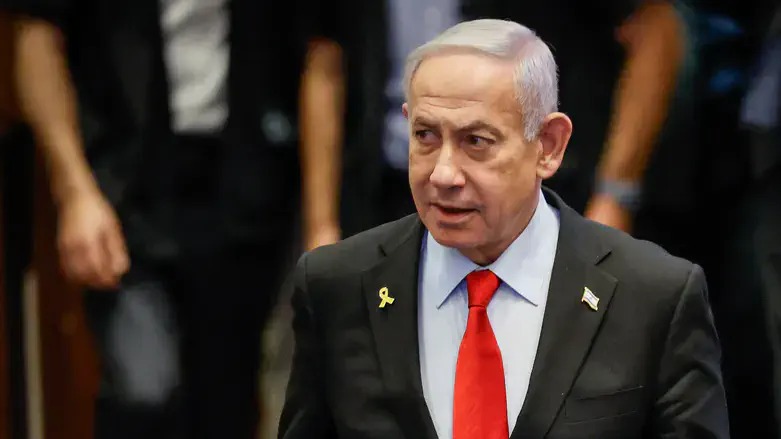Israeli Prime Minister Binyamin Netanyahu flatly rejected mounting opposition calls for a state commission of inquiry into the failures that led to Hamas’s October 7, 2023 massacre on Monday, defying public opinion polls, a court directive, and the growing demands of bereaved families.
The prime minister instead pledged to form what he called a “broadly supported national commission,” accusing his critics of seeking a politically weaponized probe. His remarks — delivered during a legally mandated “40-signature debate” — ignited outrage across the opposition, who accused him of evading accountability and attempting to rewrite history.
“We want to establish a commission of inquiry with as broad public support as possible,” Netanyahu declared. “It must represent all parts of the nation, not only one part.”
But opposition lawmakers were unmoved, calling the move a deliberate bid to control the investigation’s scope, membership, and conclusions.
Netanyahu’s resistance comes despite months of public pressure and polling showing a solid majority of Israelis demanding a full, independent state commission of inquiry. Such a commission, the highest investigative mechanism under Israeli law, would be appointed by the Supreme Court president and empowered to compel testimony, subpoena classified documents, and assign personal responsibility.
Netanyahu, however, dismissed the model as “partisan,” arguing that the right-wing public would not trust a panel chosen by Supreme Court President Isaac Amit. He invoked the United States’ 9/11 Commission as an example of “a bipartisan model” that Israel should emulate.
“The American people wanted to understand how such an event occurred,” he said. “They established a bipartisan commission. We must establish one based on broad agreement — and I will be the first to stand before it and answer every question.”
Still, Netanyahu offered no timeline, legal framework, or guarantees of independence, reinforcing opposition fears that any government-formed body would function as a shield for political leadership, not a mechanism for truth.
Opposition Leader Yair Lapid launched a searing rebuke, accusing Netanyahu of moral cowardice and historic failure.
“On your watch, no one takes responsibility,” Lapid said. “No one says, ‘I apologize,’ or ‘I am ashamed.’ You were at the head of the system when the greatest disaster in our history occurred and you have yet to accept responsibility.”
Lapid vowed that a future government would establish a genuine, independent commission “to expose the truth you’re trying to bury.”
“You think the public doesn’t care anymore,” he continued. “But the opposite is true — they understand everything. They see that this government is corrupt and rotten to the core. The end is near.”
Yisrael Beytenu chairman Avigdor Liberman went further, accusing Netanyahu of directly enabling Hamas’s rise and bearing “personal responsibility” for both the October 7 massacre and the Meron disaster before it.
“Mr. Prime Minister, you are responsible for sabotaging the conscription law and for October 7,” Liberman charged. “You corresponded with the arch-murderer Yahya Sinwar and transferred Qatari money to him. This time, you will not escape accountability.”
Liberman pledged that a future government would convene a genuine state investigation committee empowered to “interrogate everyone and draw personal conclusions.”
Former Prime Minister Naftali Bennett, commenting from outside the Knesset, condemned Netanyahu’s plan to form what he called a “fake commission.”
“The families of the fallen deserve answers, not political theater,” Bennett said. “If this government creates a puppet committee, we will abolish it on day one and form a real state inquiry into the October 7 failure.”
Netanyahu also used the debate to reassert his wartime doctrine, insisting that Israel’s campaign in Gaza and its confrontation with Hezbollah “are not over.”
“Those who seek to destroy us are rearming,” he said. “Hamas will be disarmed, Gaza will be demilitarized — it will happen, whether the easy way or the hard way.”
He claimed that coordinated military and diplomatic pressure — especially with U.S. assistance — had enabled Israel to recover “all the living hostages and most of the fallen,” though hostage families have publicly disputed that assertion, accusing him of rejecting earlier deals that could have saved lives.
The confrontation in the Knesset underscored Netanyahu’s deepening isolation. Nearly all senior defense officials from the October 7 era — including the IDF Chief of Staff, the Shin Bet director, and the Defense Minister — have since resigned. Netanyahu alone remains in office, increasingly targeted by families of victims, reservist movements, and protesters demanding accountability.
The High Court of Justice has already ruled that there is “no real argument” against establishing a state commission of inquiry and ordered the government to provide an update on its creation by mid-November.
(YWN World Headquarters – NYC)












One Response
Fact is, he’s bidding his time.
H knows it’s coming and then he’s done in.
Everyone knows why he’s pushing things off, maybe we don’t know how much and what exactly, but everyone know roughly what would be revealed one day….